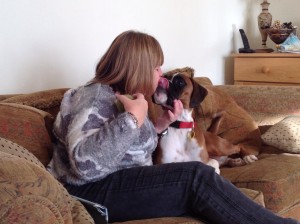Should You Kiss Your Dog? (Or, let them kiss you!?)
Lots of dog owners do it, (author included – blush). But, are there any health hazards to be aware of? In this Holidays4Dogs article we ask, should you kiss your dog and, equally, should you let your dog kiss you?
Although many dog owners feel that canine kisses and cuddles makes us feel good, most scientists and vets would probably agree this is not a great idea. While infection from canine saliva is rare, it could still be full of nasty bacteria from scavenging, eating poop, or self cleaning, for example – Yuk.
In addition, some dogs may see close contact as threatening. Close interactions with a dog can pose a danger, especially to children, who are not as good as reading canine body language.
Doesn’t canine saliva have healing properties?
 There is some evidence that canine saliva has healing properties. Historical evidence suggests that the ancient Egyptians, Greeks and man other cultures believed dog saliva has curative properties.
There is some evidence that canine saliva has healing properties. Historical evidence suggests that the ancient Egyptians, Greeks and man other cultures believed dog saliva has curative properties.
Researchers in the Netherlands managed to identify a chemical compound in pet saliva called histatins. These compounds are reputed to aid the healing process in wounds. There is even a French saying which says that, “A dog’s tongue is a doctor’s tongue”.
However, experts agree, this is not a reason to get up close and personal with your dog. In addition, allowing your dog to lick your own wounds, could carry the potential for infection.
All saliva contains nasty bacteria.
Unfortunately, evidence from allowing pets to lick open wounds is not all positive. All mammals contain bacteria in their mouths. Oral bacteria remains harmless within the area of the mouth. However, if it is introduced into an open wound, it can cause serious infection.
It can also occur if a human is bitten, or scratched, by an animal. These bacteria most commonly cause an infection of the skin called cellulitis. Anti-biotics will usually clear a cellulitis infection, but sometimes, there can be more serious complications.
While the risk of people becoming seriously ill from close contact with their dog, is relatively low, it is still wise to exercise caution. Risks may be higher in children, older people, or those with compromised immune systems.
Pick up any deposits straight away.
•Try not to let your dog eat poop, or other rotting matter.
•Always wash your hands after handling your dog, particularly if you are preparing food.
•Don’t allow your dog access to worktops or tables where food is prepared or eaten.
•Cover children’s sand pits when they are not in use.
Conclusion.
More research is needed to understand just how germs are shared between people and pets. However, there is plenty of medical evidence to show that allowing your dog to lick your face, or mouth, can cause health issues – some of them serious.
There is nothing wrong with showing your dog love and affection, but kissing your dog is probably better avoided.


